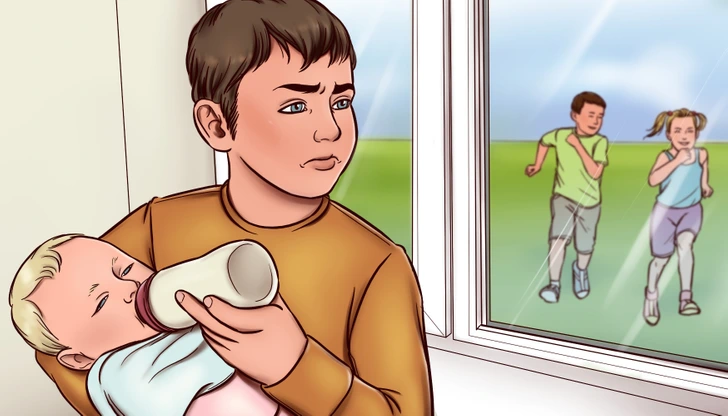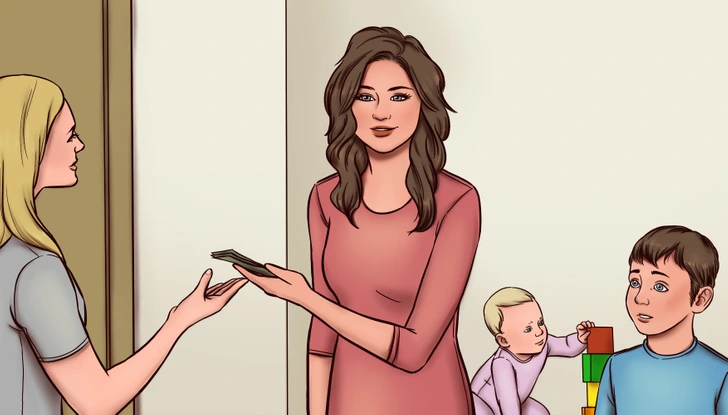When older children in a family start to reach their teenage years, it’s common for parents to feel some relief—finally, someone can help out around the house, and even take care of younger siblings. However, assigning older children the task of babysitting their younger brothers or sisters may seem convenient, but it can have lasting negative consequences. In this article, we’ll explore why it’s not always beneficial to make older children responsible for babysitting their younger siblings.

You’re Giving Them Too Much Responsibility
It’s natural to think that giving older children some responsibility will help them mature. And yes, small tasks like watching a baby while you cook dinner or helping their younger sibling with homework can be beneficial. However, there’s a big difference between occasional help and expecting your older child to take on full-time babysitting duties.
If your child is okay with the occasional babysitting session, that’s great. But often, older children don’t have a choice and feel pressured into the role of being “in charge.” This burden can quickly become overwhelming. While they might be mature for their age, older children are still kids themselves. They’re not always equipped to handle difficult situations, and if something goes wrong, they may feel guilty or believe it’s entirely their fault.
They Are Not Professionals
It’s tempting for parents, especially in large families, to rely on older siblings as caregivers because professional childcare can be expensive. However, it’s important to recognize that your older child is not a trained babysitter. They haven’t undergone professional training to deal with diaper changes, tantrums, or even minor emergencies.
While they may help around the house with tasks like playing with younger siblings, reading stories, or setting up simple activities, they shouldn’t be expected to handle more complex caregiving tasks. It’s essential to ensure that the responsibilities you give your older child are age-appropriate and don’t overwhelm them.
They Sacrifice Their Childhood
One of the biggest consequences of expecting older children to regularly babysit their younger siblings is that they may miss out on their own childhood. Unlike an only child, who may have more free time for hobbies and fun, older children with siblings often don’t get the same chance to enjoy their teenage years.
Instead of having time to hang out with friends, watch a movie, or just relax after school, older children may find themselves in a constant cycle of caregiving. Whether it’s changing diapers, potty training, or helping with homework, they may feel like they never get a break. It’s crucial to allow older children to be kids while they can—let them enjoy their own childhood without making them responsible for someone else’s.

It Can Damage Sibling Relationships
Forcing an older child to frequently take care of their younger siblings can create resentment. The older child may feel like they’re under too much pressure, and that can lead to negative feelings toward their younger siblings. Instead of building a close bond, this dynamic can cause tension.
Additionally, when an older sibling is left alone to take care of younger siblings, they often have to assume an authoritative role. The younger siblings may not always respect this authority, which can lead to arguments and fights. Over time, this can strain relationships and prevent siblings from developing a close, supportive connection.
It’s Not Their Job
Another important point to consider is that babysitting is a job. When parents expect their older children to regularly care for younger siblings without offering anything in return, it can feel unfair to the child. After all, professional babysitters are paid for their work—so why should your child do the same job for free?

If babysitting becomes a regular part of your older child’s life, it’s essential to offer some form of compensation. It doesn’t have to be financial, although an allowance can be a good incentive. You can also offer privileges like extra screen time, the use of the car, or other rewards that recognize the effort they’re putting in. This acknowledgment can help prevent feelings of resentment and make the responsibility feel more balanced.
They Need Time for Themselves
Older children need time for themselves, just like adults do. They should have the opportunity to explore their own interests, develop friendships, and enjoy extracurricular activities. If they’re constantly tasked with babysitting, they may struggle to find the time for these important aspects of growing up.
Additionally, having time away from younger siblings can help older children maintain their own identity. They can develop independence and pursue hobbies without always being tied to the role of caregiver. It’s important for parents to recognize that while older children may be helpful, they also need time to be kids.
Finding a Balance
So, what’s the solution? How can parents balance the need for help around the house with their older children’s right to have a childhood? The key is setting boundaries and making sure that babysitting duties are occasional rather than a regular, expected responsibility.
Discussing the situation openly with your older children is a great start. Ask them how they feel about helping out and make sure they’re not overwhelmed. If they express that the responsibility feels too much, it’s important to listen and make adjustments. Helping out every now and then is fine, but it’s essential to ensure they’re not taking on a role that feels more like a second parent.
Conclusion: Let Kids Be Kids
While having older children help out with younger siblings can be beneficial in some situations, it’s important not to place too much responsibility on their shoulders. They need the space to enjoy their own childhood and explore their own interests, free from the pressures of constant caregiving.
Finding the right balance between family help and allowing your older children to be kids is key. Recognizing their efforts, compensating them when necessary, and ensuring their well-being is prioritized can help maintain healthy relationships and prevent negative outcomes in the long run. After all, childhood only happens once—let them enjoy it.


